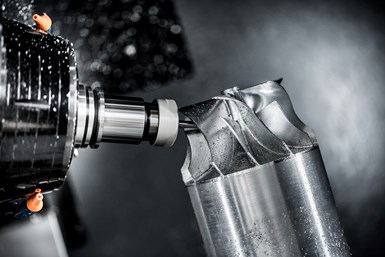PMPA: Providing Ways to Meet Material Challenges
“Our PMPA members are members because they’ve witnessed the results that show we’re better together. Despite multiple significant challenges, our numbers are growing. PMPA provides services to help their members meet the challenges that they face daily.” – Aneesa Muthana, PMPA President

Photo Credit: Thinkstock
Material Challenges Are Complex
In normal times, there are two challenges our shops face in the material space — the price of the material and the lead time to get it. Recently, price has been extremely painful for steel, stainless steel and aluminum because of the impact of Federal Tariffs (now “tariff rate quotas.”) These tariff assessments result in our shops in the U.S. paying an additional $500 per ton for hot roll steel compared to competitors in China. (Data from Steel Benchmarker March 14, 2022. Hot roll steel is the base steel commodity and is a proxy representing the dynamics for the pricing our shops are experiencing for special quality cold drawn steel bars). Our shops are paying prices that are 171% of the price that our Asian competitors are paying.
High prices are not insurmountable — communication with the customer can let them decide if their need for parts is such that they will purchase despite the pass-through of the higher material cost. Demand is high across the economy — 70% of PMPA shops reported scheduling overtime in March — and the opportunity to have the pricing conversation with our customers is the first step toward getting to “YES!”
If only price was the only challenge our shops face. Supply — availability of raw materials — is another challenge and perhaps even more devastating in its impact. If you can’t get material at any price, you can’t possibly get the job. The tariffs and the current tariff rate quotas have distorted the availability in the market of some materials, with some domestic mills producing highest margin materials rather than materials with lower margin but greater market demand and utility. As a result, many times a shop will be forced to look for overseas suppliers in order to find needed material — and pay the tariff — because the needed steel (or aluminum) is not available from domestic suppliers.
However, foreign companies produce to different standards than U.S. suppliers, and so determining what materials are “nominally equivalent” becomes an obstacle to purchasing. This is often compounded by foreign languages encountered on web pages, specifications as well as the lack of trust from websites of unknown provenance. “Don’t believe everything you read on the internet,” is a popular Abraham Lincoln meme and makes the point.
Basing your material decisions for the contract for human safety-critical parts on information provided on an internet page with unknown credibility is not likely to pass quality system, nor legal system muster.
This has been especially troublesome in stainless steel for Swiss machining applications. Swiss quality, requiring very high quality for straightness, dimensional tolerance, surface finish, internal soundness and consistency, has become very difficult to obtain, due to a fatality at a leading supplier in Europe. With a leading supplier out of production, available materials have decreased. This makes finding stainless steel suitable for our shops’ demanding Swiss precision applications even more difficult.
PMPA Helps Members Find Materials
PMPA offers several ways to assist members with their search for hard-to-find materials. Here are three:
Nominal Steel Grade Translator
At pmpa.org under Member Links there is a link to the Nominal Steel Grade Translator that members can access to confirm the “nominal equivalency” of a foreign grade to the North American standard. Steel grade designations from China, Germany and Japan are translated to North American ASTM/SAE/AISI grade designations. Entering a foreign steel designation will return a nominal North American equivalent. For grades that do not return a result, PMPA members are asked to submit an email to info@pmpa.org and PMPA staff will look it up using accredited agency references from Europe, China and the United States.

Example: A shop is offered 1.4301 X5CrNi18-10. Entering 1.4301 in the PMPA Nominal Grade Translator returns a report confirming the material to be a nominal equivalent to U.S. grade 304.
Material & Equipment Exchange
A second means of assisting PMPA members is through our members-only Materials and Equipment Exchange (M&E), where manufacturing members can solicit (items wanted) or offer for sale (item for sale) materials in their inventory for which they no longer have commercial need. Of six current entries on the M&E, half are for aluminum or stainless steel materials.

Listings on PMPA’s Material & Equipment Exchange
PMPA’s Manufacturing and Technical Listserve
PMPA’s Manufacturing and Technical Listserve is an active email community where members provide each other with assistance by answering technical questions, problem-solving or discussing technical issues. Occasionally, an urgent need for material (or a tool or gage) is posted on this listserve, usually resulting in needs met.
In the past month, requests have gone out for oversize 1215 bars for screw machine use, high-precision tellurium copper rounds, 304 stainless bars for Swiss machining, A-2 drill rod and alternatives available for 6161 aluminum.
Despite the challenges we face daily, PMPA precision machining shops are thriving. The support that PMPA provides our members in areas such as material challenges is just one way that belonging to PMPA makes us all “Better Together.” Where do you turn for assistance when you need help that is above your pay grade? PMPA provides ways and means for all of us to share our expertise to sustain our manufacturing jobs here in North America. Why go it alone?
Read More Articles from PMPA:
- PMPA’s Award-Winning Mastery Program
- Craftsman Cribsheet #107: Quick Cross-Reference for Foreign Designations for Stainless Steels
About the Author
Miles Free III
Miles Free III is the PMPA Director of Industry Affairs with over 40 years of experience in the areas of manufacturing, quality, and steelmaking. He helps answer “How?, “With what?” and “Really?” Miles’ blog is at pmpaspeakingofprecision.com; email – mfree@pmpa.org; website – pmpa.org
Related Content
Precision Ground Barstock: How It Is Manufactured, Benefits to Your Shop
Understanding the benefits provided by precision centerless ground barstock can help you avoid false economy and optimize the work you quote by maximizing benefits to your manufacturing process and customer.
Read MoreMachining Unleaded Materials — Reliability is Possible
Leaded steel is no longer produced in the United States. How do shops approach unleaded brass and steel machining?
Read MoreA No/Low-Cost Solution to Employee Retention
Studies show a little employee recognition goes a long way. Here are the 5Ws to consider for success.
Read MoreOnshoring Weather Report: Strong Tailwinds!
Onshoring, reshoring, nearshoring: these terms are showing up with increasing frequency in the news and online. But is there evidence that these are real?
Read MoreRead Next
A Tooling Workshop Worth a Visit
Marubeni Citizen-Cincom’s tooling and accessory workshop offers a chance to learn more about ancillary devices that can boost machining efficiency and capability.
Read MoreDo You Have Single Points of Failure?
Plans need to be in place before a catastrophic event occurs.
Read More5 Aspects of PMTS I Appreciate
The three-day edition of the 2025 Precision Machining Technology Show kicks off at the start of April. I’ll be there, and here are some reasons why.
Read More









.png;maxWidth=300;quality=90)












